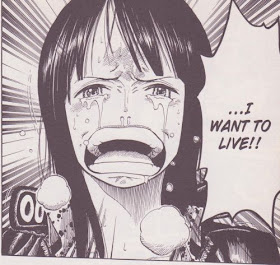.jpg)
-1.jpg)
.jpg)
-1.jpg)
.jpg)
.jpg)
It's the worst thing Olvia could have done, and it's enough to wrench one's heart right out. Oda isn't completely heartless though; with the revelation that Robin does have enough archaeological knowledge to make her a target, she is able to have a reunion with her daughter, albeit a short-lived one, but she has resigned herself to her fate along with the rest of Ohara. However, she tells Robin to live, to keep striving for knowledge that can improve the future of the world. Robin does escape, but her home and everyone she has ever known is killed, and as we see in a montage of the subsequent years, she has lived her entire life since then on the run, never able to trust anyone and feeling like the whole world wants her dead for the crime of simply existing. By the time of the present story, it's understandable why she would have finally resigned herself to death, if only as a way to ensure the safety of the Straw Hat Pirates, the only people who have ever accepted her or shown her any kindness. So when Luffy and the rest of the crew realize this, the sign of solidarity they show is one of the most powerful, moving moments the series has yet seen:
.jpg)
-1.jpg)
.jpg)
.jpg)
.jpg)
-2.jpg)
.jpg)
Oda had been building to this moment for several volumes by this point, with Robin having apparently betrayed the crew, then seeming to inexplicably choose to die in hopes that they would escape safely, but we know Luffy and crew aren't the type to run away. Instead, they take the awe-inspiring step of taking on the entire force of the world government in order to save a friend, and it's enough to make the reader wipe the tears out of their eyes, stand up, and cheer. That's what shonen manga should be all about, and Oda delivers on that promise like nothing else I've ever seen.

No comments:
Post a Comment